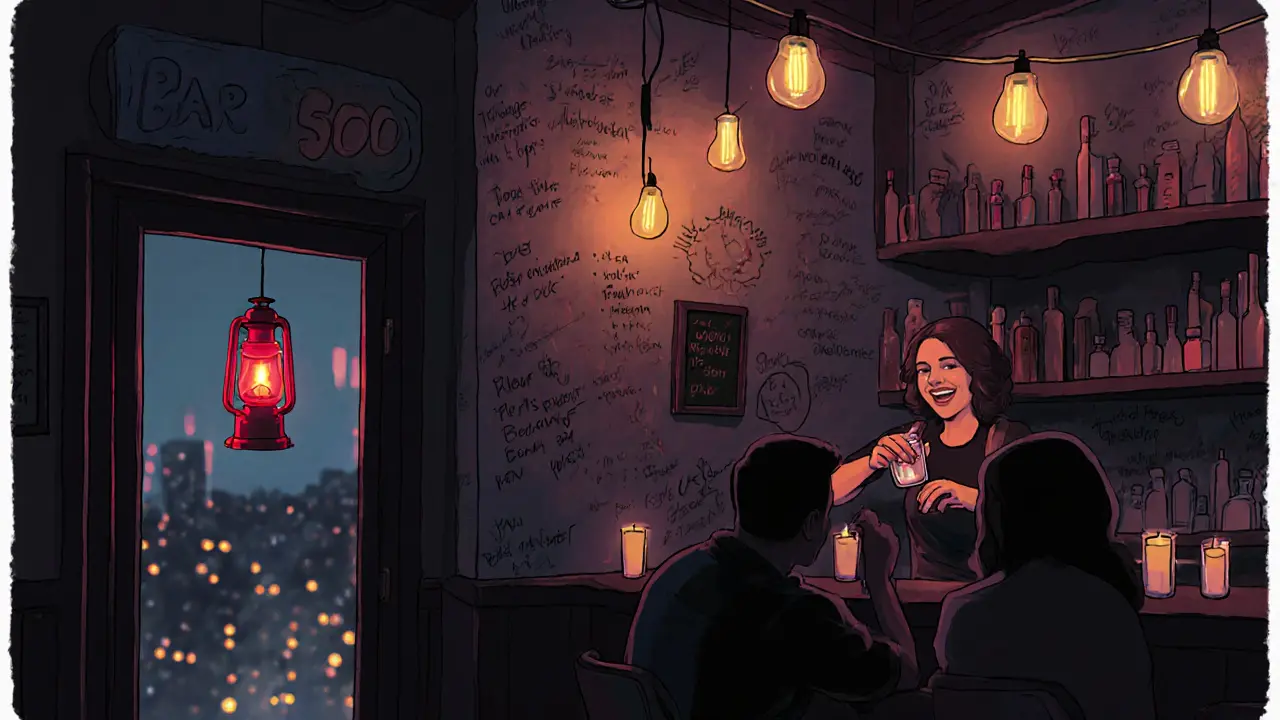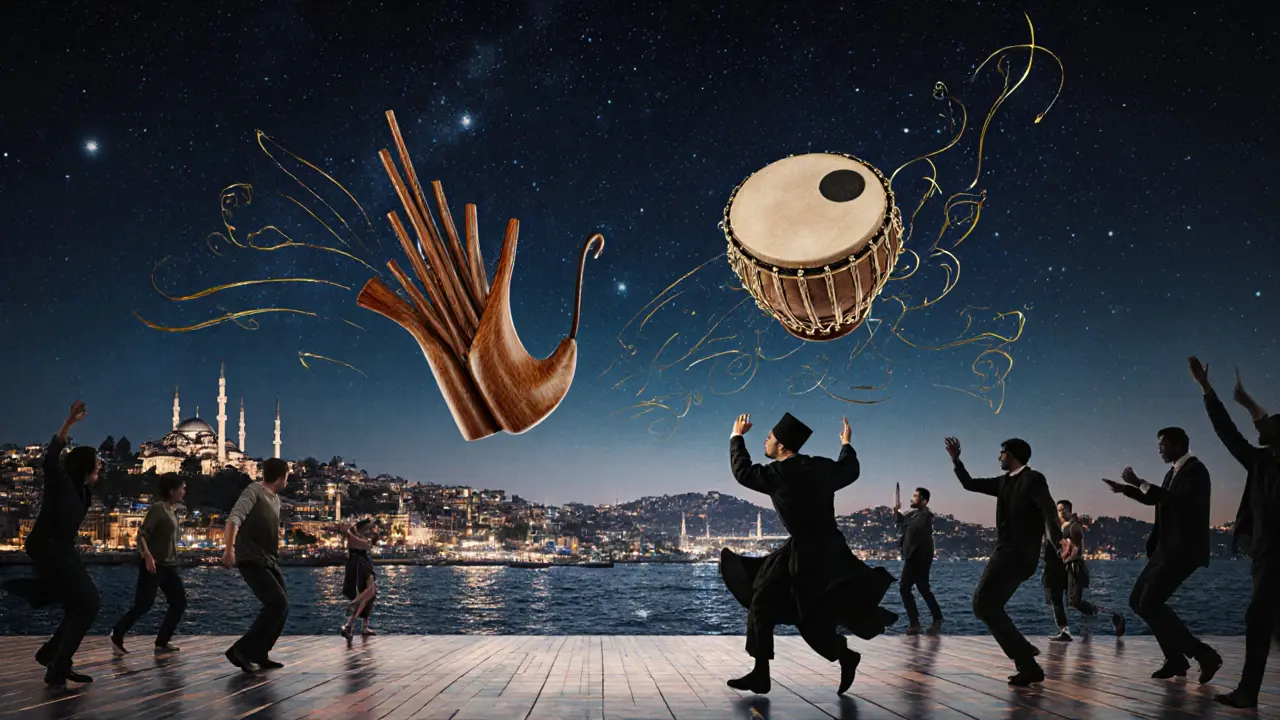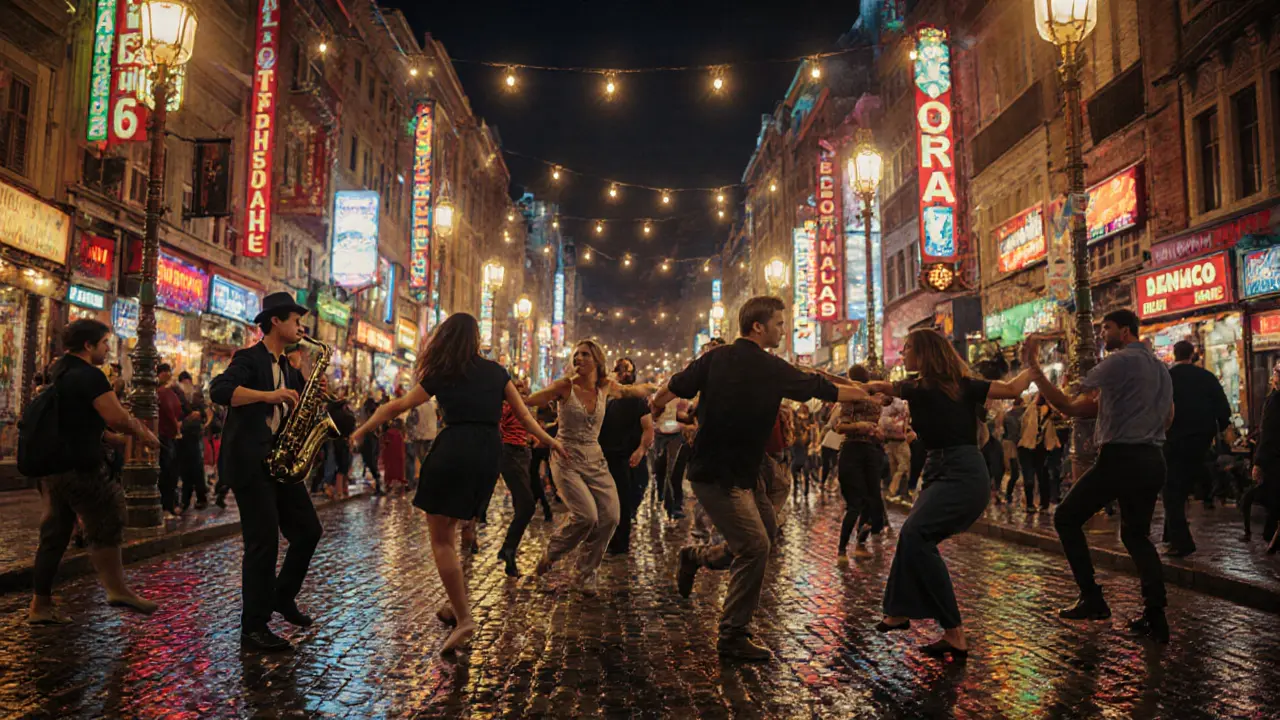When the sun sets over the Bosphorus, Istanbul doesn’t sleep-it transforms. The city’s nightlife isn’t just about dancing or drinking. It’s a living mosaic of identities, sounds, and stories that refuse to be boxed in. From hidden rooftop lounges in Beyoğlu to underground techno basements in Kadıköy, Istanbul’s after-dark scene thrives because it welcomes everyone. You don’t need to fit a mold here. You just need to show up.
Where the Streets Come Alive After Dark
İstiklal Avenue, the bustling pedestrian street in Beyoğlu, turns into a pulsing artery of sound and color by 10 p.m. Street musicians play everything from Turkish folk tunes to jazz covers. A group of friends might start the night at a cozy wine bar like Bar 1907, where the cocktails are crafted with local herbs and the playlist leans toward 70s Anatolian rock. By midnight, they’re dancing in a packed club like Reina, where the crowd includes Turkish teens, expats from Berlin, Syrian refugees, and retirees who still know how to tango.
Unlike other global cities where nightlife is segregated by class or taste, Istanbul’s scenes bleed into each other. You’ll find a drag show next door to a traditional ney flute performance. A queer poetry reading might end with a group of grandmothers joining in for a spontaneous folk dance. There’s no gatekeeping here-just an unspoken rule: if you’re respectful, you belong.
The Quiet Revolution of LGBTQ+ Spaces
Istanbul’s LGBTQ+ community has faced political pressure, legal ambiguity, and social stigma for years. Yet, their nightlife hasn’t disappeared-it’s adapted. Underground venues like Bar 500 in Nişantaşı and Club 33 in Şişli have become sanctuaries. These aren’t flashy tourist spots. They’re places where people can be themselves without fear of being watched or reported.
At Bar 500, the bartender knows your name by your third visit. The walls are covered in handwritten notes from patrons: “I found my voice here,” “This is the only place I feel safe,” “My parents don’t know I come here, but they should.” The club doesn’t advertise on social media. It grows through word of mouth, through trust.
Trans women, nonbinary artists, and queer refugees from Iran and Syria run many of these spaces. Their resilience isn’t performative-it’s survival. And it’s made Istanbul’s queer nightlife one of the most authentic in the region. You won’t find rainbow flags plastered on every window. But you’ll find something rarer: real community.
Music That Defies Borders
Listen closely in any Istanbul club after midnight, and you’ll hear a layered soundtrack. A duduk blends with a bassline. A techno beat rides over the rhythm of a darbuka. This fusion isn’t accidental. It’s intentional. DJs like Emre Yüce and Özlem Kaya don’t just play music-they weave cultures together.
At Yapı Kredi Art Gallery’s monthly night events, you’ll find electronic sets paired with live Sufi drumming. At İstanbul Modern’s rooftop parties, hip-hop artists sample Ottoman-era melodies. Even the mainstream clubs like Hakkasan and Klub now book artists who blend traditional Turkish instruments with global genres.
This isn’t just about novelty. It’s about identity. Young Turks are reclaiming their heritage not by clinging to the past, but by remixing it. And the result? A sound that’s unmistakably Istanbul-global, local, and deeply personal.

Immigrant Voices, Nighttime Stages
Over 4 million Syrians now live in Turkey, and many of them have built their own nightlife spaces. In the neighborhood of Bayrampaşa, you’ll find Syrian-owned cafés that turn into live music venues after 9 p.m. The music? Arabic pop, Palestinian folk, and Syrian oud ballads. The crowd? Syrians, Turks, Kurds, and even a few tourists who stumbled in looking for coffee.
At Al-Masri, a small bar in the heart of the district, the owner, Amal, serves mint tea and shisha alongside live performances by refugee musicians. “We don’t have a big stage,” she says. “But we have hearts. And that’s enough.”
These spaces aren’t tourist attractions. They’re lifelines. They’re where people who’ve lost everything rebuild a sense of belonging. And in Istanbul, that’s part of the nightlife too.
When the Rules Change, the Night Doesn’t
City officials have tried to shut down clubs, impose curfews, and ban alcohol sales after midnight. In 2023, a new law limited the number of licenses for new venues in central districts. But people didn’t stop going out-they just moved. Basements became clubs. Rooftops became dancefloors. Empty warehouses in Üsküdar turned into secret venues with no signs, just a single red lantern outside.
These underground spots operate on honor systems. No ID checks. No bouncers. Just a friendly face at the door who asks, “You here for the music?” If you nod, you’re in.
It’s not perfect. Some nights, police show up. Some venues close without warning. But the culture keeps evolving. The same people who were dancing at Reina last month might be at a warehouse party in Maltepe next weekend. The scene is fluid. And that’s its strength.

What Makes Istanbul’s Nightlife Different
It’s not the neon lights. It’s not the price of cocktails. It’s the fact that here, your identity doesn’t need permission to exist.
In New York, you might find a gay bar. In Berlin, you’ll find a techno haven. In Istanbul, you’ll find both-and they’re in the same building, on the same night, sharing the same dancefloor.
There’s no single “Istanbul nightlife.” There are dozens. And each one is shaped by the people who show up. A student from Ankara. A retired sailor from Izmir. A Syrian poet. A Turkish trans artist. A German backpacker who just wants to dance without being stared at.
You don’t need to be a local to feel at home. You just need to be open. And that’s the real magic of the city after dark.
Is Istanbul nightlife safe for LGBTQ+ travelers?
Yes, but with awareness. While Istanbul has a vibrant and welcoming LGBTQ+ scene, public displays of affection can still attract unwanted attention in some areas. Stick to known venues like Bar 500, Club 33, or the monthly events at Istanbul Modern. Avoid walking alone late at night in conservative neighborhoods. Most clubs and bars are safe, and staff are trained to protect their patrons. Trust your gut-if a place feels off, leave.
What’s the best night to experience Istanbul’s diverse nightlife?
Friday and Saturday nights are the busiest, but Tuesday and Wednesday nights are where you’ll find the most authentic, less touristy scenes. Many underground venues and queer spaces host special events midweek-think poetry slams, experimental music sets, or community potlucks. These nights are quieter, more intimate, and often more meaningful. If you want to see the real pulse of the city, skip the weekend crowds.
Are there family-friendly nightlife options in Istanbul?
Absolutely. Many neighborhoods host evening cultural events that welcome all ages. In Kadıköy, the Kadıköy Meydanı often has live music, street theater, and food stalls until midnight. In Beşiktaş, the Çırağan Palace courtyard hosts open-air jazz concerts. These events are free, quiet, and perfect for families. You’ll see grandparents dancing with grandchildren, and toddlers sleeping on their parents’ laps-just as much a part of Istanbul’s nightlife as any club.
Do I need to speak Turkish to enjoy Istanbul’s nightlife?
Not at all. English is widely spoken in nightlife districts like Beyoğlu, Nişantaşı, and Kadıköy. Most bartenders, DJs, and venue staff speak at least basic English. But learning a few Turkish phrases-like “Teşekkür ederim” (thank you) or “Bu ne?” (what’s this?)-goes a long way. Locals appreciate the effort, and it often leads to better recommendations, free shots, or invitations to hidden spots you’d never find on Google Maps.
What’s the dress code for Istanbul clubs?
There’s no strict dress code, but smart casual works best. In upscale spots like Reina or Hakkasan, men often wear collared shirts and clean jeans. Women might wear dresses or stylish separates. In underground venues, anything goes-tattoos, piercings, and gender-fluid outfits are the norm. Avoid flip-flops and sportswear in most clubs. The vibe is relaxed, but not sloppy. Think: comfortable, intentional, and confident.
Can I find vegetarian or vegan food at Istanbul nightlife spots?
Yes, and it’s better than you think. Many bars and clubs now offer vegan meze plates-think stuffed grape leaves, grilled eggplant, hummus, and lentil patties. Places like Çiğdem in Karaköy and Greenhouse in Nişantaşı specialize in plant-based Turkish cuisine. Even traditional kebab joints have added vegan options. Don’t assume Turkish food is all meat-many dishes are naturally vegan, and locals are happy to guide you.
Where to Go Next
If you’ve experienced Istanbul’s nightlife and want to dig deeper, start with the monthly İstanbul Queer Arts Festival in June. Or visit Bar 500 on a Thursday night for their open mic. Try a walking tour with Hidden Istanbul Nights, led by local queer guides. These aren’t tourist traps-they’re invitations to belong.
Istanbul’s nightlife isn’t about checking off clubs. It’s about finding your rhythm in a city that refuses to be silent. Come with curiosity. Leave with friends.

Caspian Beauchamp
Hello, my name is Caspian Beauchamp, and I am an expert in the world of escort services. With years of experience in the industry, I have developed a deep understanding of the dynamics and nuances of escort services in various cities. My passion for writing has led me to share my insights and knowledge through articles and blog posts, helping others navigate the world of companionship and pleasure. I pride myself on providing honest, accurate, and engaging content that appeals to a wide range of readers. Join me as I explore the fascinating world of escorts and the unique experiences they offer in cities around the globe.